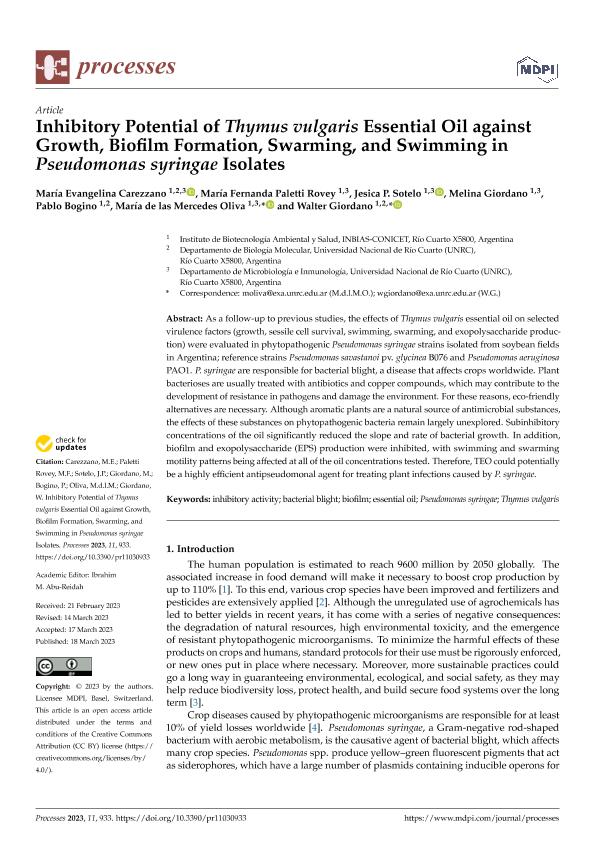Artículo
Inhibitory potential of Thymus vulgaris essential oil against growth, biofilm formation, swarming and swimming in Pseudomonas syringae isolates
Carezzano, Maria Evangelina ; Paletti Rovey, María Fernanda
; Paletti Rovey, María Fernanda ; Sotelo, Jesica Paola
; Sotelo, Jesica Paola ; Giordano,; Bogino, Pablo Cesar
; Giordano,; Bogino, Pablo Cesar ; Oliva, Maria de Las Mercedes
; Oliva, Maria de Las Mercedes ; Giordano, Walter Fabian
; Giordano, Walter Fabian
 ; Paletti Rovey, María Fernanda
; Paletti Rovey, María Fernanda ; Sotelo, Jesica Paola
; Sotelo, Jesica Paola ; Giordano,; Bogino, Pablo Cesar
; Giordano,; Bogino, Pablo Cesar ; Oliva, Maria de Las Mercedes
; Oliva, Maria de Las Mercedes ; Giordano, Walter Fabian
; Giordano, Walter Fabian
Fecha de publicación:
03/2023
Editorial:
Multidisciplinary Digital Publishing Institute
Revista:
Processes
e-ISSN:
2227-9717
Idioma:
Inglés
Tipo de recurso:
Artículo publicado
Clasificación temática:
Resumen
As a follow-up to previous studies, the effects of Thymus vulgaris essential oil on selected virulence factors (growth, sessile cell survival, swimming, swarming, and exopolysaccharide production) were evaluated in phytopathogenic Pseudomonas syringae strains isolated from soybean fields in Argentina; reference strains Pseudomonas savastanoi pv. glycinea B076 and Pseudomonas aeruginosa PAO1. P. syringae are responsible for bacterial blight, a disease that affects crops worldwide. Plant bacterioses are usually treated with antibiotics and copper compounds, which may contribute to the development of resistance in pathogens and damage the environment. For these reasons, eco-friendly alternatives are necessary. Although aromatic plants are a natural source of antimicrobial substances, the effects of these substances on phytopathogenic bacteria remain largely unexplored. Subinhibitory concentrations of the oil significantly reduced the slope and rate of bacterial growth. In addition, biofilm and exopolysaccharide (EPS) production were inhibited, with swimming and swarming motility patterns being affected at all of the oil concentrations tested. Therefore, TEO could potentially be a highly efficient antipseudomonal agent for treating plant infections caused by P. syringae.
Archivos asociados
Licencia
Identificadores
Colecciones
Articulos (IMICO)
Articulos de INSTITUTO DE INVESTIGACION EN MICOLOGIA Y MICOTOXICOLOGIA
Articulos de INSTITUTO DE INVESTIGACION EN MICOLOGIA Y MICOTOXICOLOGIA
Articulos (INBIAS)
Articulos de INSTITUTO DE BIOTECNOLOGIA AMBIENTAL Y SALUD
Articulos de INSTITUTO DE BIOTECNOLOGIA AMBIENTAL Y SALUD
Articulos(CCT - CORDOBA)
Articulos de CTRO.CIENTIFICO TECNOL.CONICET - CORDOBA
Articulos de CTRO.CIENTIFICO TECNOL.CONICET - CORDOBA
Citación
Carezzano, Maria Evangelina; Paletti Rovey, María Fernanda; Sotelo, Jesica Paola; Giordano, ; Bogino, Pablo Cesar; et al.; Inhibitory potential of Thymus vulgaris essential oil against growth, biofilm formation, swarming and swimming in Pseudomonas syringae isolates; Multidisciplinary Digital Publishing Institute; Processes; 11; 3; 3-2023; 1-17
Compartir
Altmétricas



